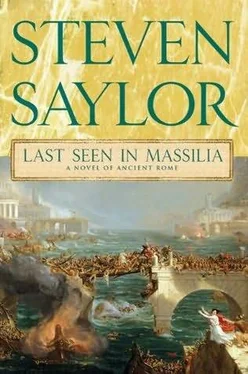Steven Saylor - Last seen in Massilia
Здесь есть возможность читать онлайн «Steven Saylor - Last seen in Massilia» весь текст электронной книги совершенно бесплатно (целиком полную версию без сокращений). В некоторых случаях можно слушать аудио, скачать через торрент в формате fb2 и присутствует краткое содержание. Жанр: Исторический детектив, на английском языке. Описание произведения, (предисловие) а так же отзывы посетителей доступны на портале библиотеки ЛибКат.
- Название:Last seen in Massilia
- Автор:
- Жанр:
- Год:неизвестен
- ISBN:нет данных
- Рейтинг книги:3 / 5. Голосов: 1
-
Избранное:Добавить в избранное
- Отзывы:
-
Ваша оценка:
- 60
- 1
- 2
- 3
- 4
- 5
Last seen in Massilia: краткое содержание, описание и аннотация
Предлагаем к чтению аннотацию, описание, краткое содержание или предисловие (зависит от того, что написал сам автор книги «Last seen in Massilia»). Если вы не нашли необходимую информацию о книге — напишите в комментариях, мы постараемся отыскать её.
Last seen in Massilia — читать онлайн бесплатно полную книгу (весь текст) целиком
Ниже представлен текст книги, разбитый по страницам. Система сохранения места последней прочитанной страницы, позволяет с удобством читать онлайн бесплатно книгу «Last seen in Massilia», без необходимости каждый раз заново искать на чём Вы остановились. Поставьте закладку, и сможете в любой момент перейти на страницу, на которой закончили чтение.
Интервал:
Закладка:
"I heard the speech he delivered to his troops.," Wry and ironical it had been, fearless and without illusion. Catilina had faced destruction with his eyes wide open, perversely defiant to the end.
"And you saw his final moments?"
I sighed. "Meto and I were near Catilina when the fighting began. He planted his eagle standard in the ground. That was the spot where he made his last stand. I saw the standard fall…"
"The eagle standard!" gasped Publicius. "The eagle standard of Marius himself, which Catilina held in trust for the next deliverer to come."
Publicius and Minucius raised their hands and chanted together: "The eagle standard! The eagle standard!"
"Yes, well… I felt increasingly uncomfortable in the presence of these two fawning acolytes of a dead deliverer. "If you were such staunch supporters of Catilina, why were you not there at Pistoria as well?"
As they had chanted, so they blushed in unison. Publicius cleared his throat. "We and a few others came here to Massilia in advance of Catilina, to clear the way for his arrival. Up until very near the end, it was in his mind to escape to Massilia, here to plan his triumphant return to Rome. But in the end, alas, he could not abandon the country and the people he sought to deliver from the Senate's tyranny. Catilina chose martyrdom over exile. He made his stand at Pistoria and fell there. It was left to us, the handful of his followers who had fled to Massilia, to keep his memory alive."
"To keep his dream alive!" added Minucius.
"And now the gods have led you here, Gordianus the Finder. Have led both you and your son to Massilia! It can only be a sign that the faith we have kept alive all these years has been justified, that the gods have looked down upon us and given us their blessing."
"My son-how did you know he was here?"
"Because he came to us, of course. He sought us out in secret. When he revealed to us who he was-"
"No one less than Meto, who fought with Catilina at Pistoria, who crossed the Rubicon with Caesar-"
"We could hardly believe it. It was a sign, of course. A sign of the gods' favor-"
"Favor?" I snapped. "You fools! My son is dead."
There was an awkward silence. My two visitors gazed sidelong at each other, keeping their mouths shut but working their eyebrows and lips, as if debating some point purely by an exchange of facial expressions. Finally Publicius stepped forward. He took my hand, which hung limply at my side.
"Come with us, Gordianus. We have something to show you. And something to tell you."
"Tell me now, then."
He shook his head gravely. "No, not here." He looked askance
at Hieronymus and lowered his voice. "This place is… not suitable." Impure, he meant. Unclean, on account of the scapegoat. "Come, Gordianus. You must see what we have to show you. You must hear what we have to say."
I swallowed hard. The visit from the Gaulish merchant had distracted me, had lured me with a puzzle to take me out of myself and away from my misery. The visit from these latterday Catilinarians had plunged me back into an unhappy past and an even more miserable present. What of any consequence could they show me? What could they tell me that I didn't already know? I looked to Davus, who saw my indecision and gave an eloquent shrug, as if to say, Why not? What have we to lose, father-in-law, stuck here on the edge of nowhere?
"Very well," I said. "Davus and I will go with you."
"And where are you taking my guests?" inquired Hieronymus, who clearly thought as little of the two Romans as I did. "That, Scapegoat, must be a secret," said Publicius, with his nose in the air.
"But I'm this man's host, and as such I'm obliged to look after his safety. Before he leaves my home, you'll have to tell me where you're taking him."
Publicius and Minucius conferred in whispers. At last Publicius looked up. "I don't suppose there's any harm in telling you," he said, with the unsubtle implication that the scapegoat's days were numbered. "We're taking Gordianus to the house of Gaius Verres."
Verres! The name was synonymous with corruption, extortion, limitless greed, and the very worst sort of misgovernment. As my two visitors conducted Davus and me through the streets of Massilia, I wondered what possible link could connect these last pitiful sheep from Catalina’s flock to the most notorious of all Roman exiles.
It was Cicero who had prosecuted Gaius Verres a little over twenty years ago. The case had been a major scandal and established Cicero as the preeminent advocate in Rome, even as it destroyed Verres, who fled for Massilia before the court could deliver its damning verdict. The charge against Verres was extortion and criminal oppression of the people of Sicily during his three years as provincial governor of the island. Roman governors have always been notorious for exploiting their provinces and lining their own purses at the expense of the governed, while the Senate, whose members all hope for the opportunity to do the same themselves someday, turns a blind eye. It was indicative of the egregiousness of Verres's conduct that he was actually brought to trial for his offenses.
According to Cicero, who had also served as an administrator in Sicily, Verres had not only extorted the populace and plundered their civic treasuries, but had virtually stripped the island bare of every beautiful man-made object. Verres's appetite for fine works of art amounted to a mania. He especially loved paintings of the sort done in encaustic wax on wood, not least because they could easily be carried off, and he assiduously built himself a collection of the best pictures to be gleaned from every public space and private gallery in Sicily. But his greatest passion was for statues. Before Verres, every town square in Sicily, even the humblest, was decorated with the statue of a local hero or some particularly venerated deity; after Verres, the pedestals stood empty-except in those instances where the scoundrel, to squeeze even more money from the locals, had forced them to erect statues of himself, charging them outrageous sums for the privilege. Anyone who dared to oppose him, whether Sicilian or Roman, was ruthlessly disposed of. His behavior while he controlled the island was more that of a pirate than a provincial governor.
As soon as Verres's tenure was up and he returned to Rome, the Sicilians sought restitution from the Roman Senate and looked for a way to prosecute the man who had robbed them. Cicero took up their cause and, despite all Verres's legal finagling and the Senate's reluctance to prosecute one of its own, Cicero and the Sicilians eventually prevailed. The evidence assembled against Verres was so damning that even the Senate had to act; and as the trial progressed, Verres chose to flee Rome rather than face the verdict. The connoisseur of fine art set another fashion in his choice of destination; Verres fled for Massilia, and in the twenty years of political chaos that ensued, wave upon wave of Roman political exiles would follow him.
I knew who Gaius Verres was, of course-what Roman didn't? — but I had I never laid eyes on him. I knew that he was here in Massilia, but I had never expected our paths to cross. But then, nothing predictable or expected had occurred since the moment we emerged from the flooded tunnel into the city. More and more it seemed to me that Massilia was an unfamiliar world with its own peculiar rules of logic to which I must bend, willingly or not.
Verres's house was not far from the scapegoat's, somewhere along the way to Milo's house. Within her encircling walls, Massilia was a small city, and her fashionable district was very compact.
The house itself surprised me by its opulence. One thinks of exiles living in ruin and misery, or at least in reduced circumstances. But the house of Verres was even more ostentatious than that of the scapegoat, with a brightly colored facade in shades of pink and yellow, and elaborate columns flanking the entrance. A slave admitted us at once; the Catilinarians were obviously familiar visitors. The foyer was floored with yellow marble with swirling red veins, and, like a Roman house, had niches on either side housing the busts of Verres's ancestors. Or so I thought upon first glance. When my eyes adjusted to the dimness, I saw that the busts were not of ancestors after all, unless Verres claimed descent from the likes of Pericles, Aeschylus, and Homer. He had used the niches reserved for sacred display to show off specimens from his sculpture collection!
Читать дальшеИнтервал:
Закладка:
Похожие книги на «Last seen in Massilia»
Представляем Вашему вниманию похожие книги на «Last seen in Massilia» списком для выбора. Мы отобрали схожую по названию и смыслу литературу в надежде предоставить читателям больше вариантов отыскать новые, интересные, ещё непрочитанные произведения.
Обсуждение, отзывы о книге «Last seen in Massilia» и просто собственные мнения читателей. Оставьте ваши комментарии, напишите, что Вы думаете о произведении, его смысле или главных героях. Укажите что конкретно понравилось, а что нет, и почему Вы так считаете.










